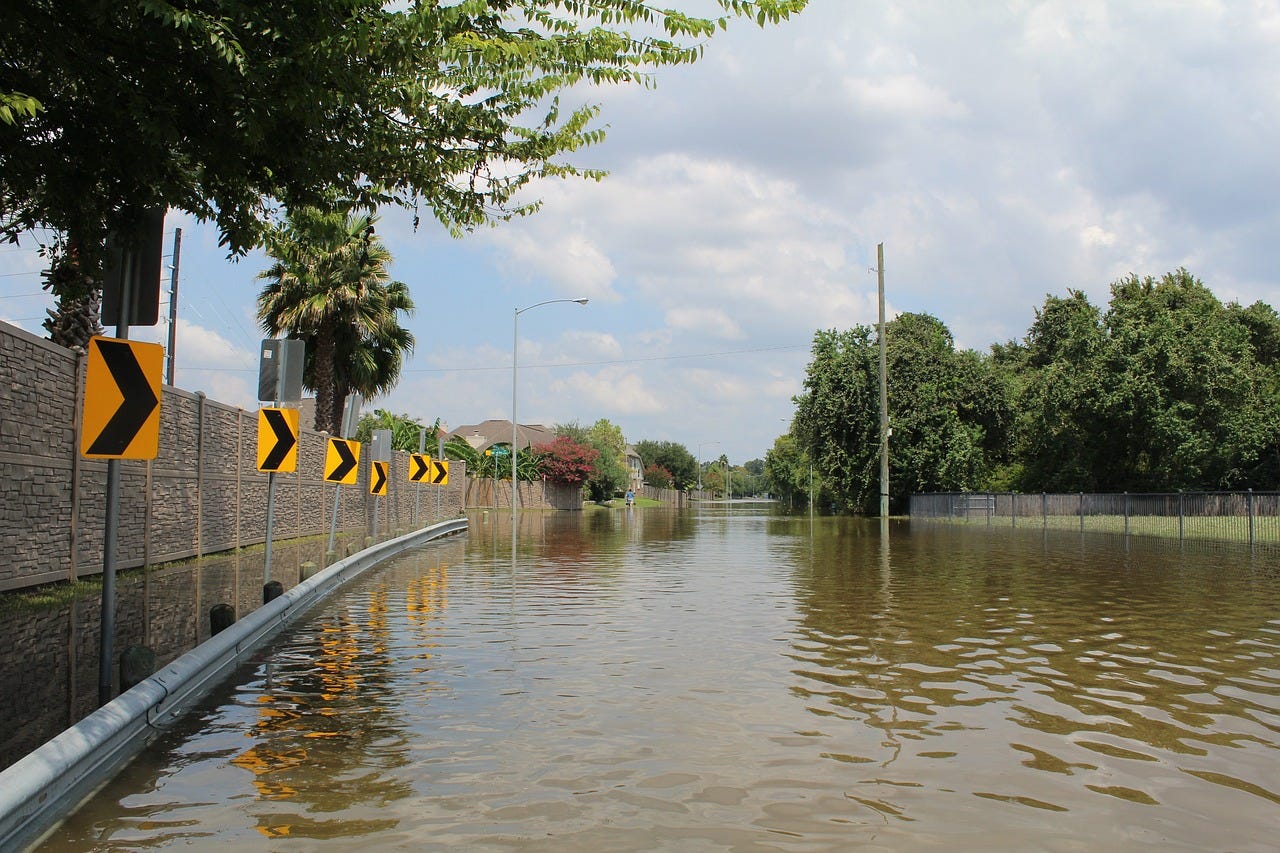What the great flood of Texas tells us
Guest post by an activist whose debut novel explores how climate change actually feels

Hi folks,
Rashmee here. Still on holiday but couldn’t resist the chance to put out a very special guest post by author and climate activist Denise S Robbins in the wake of the catastrophic flood that killed more than 100 people in Texas over the US Independence Day weekend.
Denise is from Wisconsin in the American Midwest, where she returned after sixteen years of climate activism on the East Coast. Her debut novel, The Unmapping, was published last month.
As always, This Week, Those Books links the big international story to the world of books. Our aim is to provide crucial context — from fiction and non-fiction — to the shouty, doomscroll news cycle. We’ve been going two years and have built up a following in 121 countries. It’s a small operation here at TWTB and we’re sustained by reader support. If you find This Week, Those Books useful, thoughtful, and…a conversation starter, please read, respond, refer a friend.
Housekeeping note:
We’re still on our travels in July (hopefully no more floods!) and will be back properly in August.
The Big Story:
For three days from July 4, a tropical storm brought a deadly deluge to a region of central Texas known as Hill Country, which is considered one of the deadliest places in the US1 for flash flooding.
Fuelled by remnants of Tropical Storm Barry, torrential rainfall surged the river by 25 to 30 feet in under an hour. At times, the water rose one inch every 25 seconds. At the time of writing, some 170 people are missing and questions are being asked about the state government’s response to the catastrophe.
These books offer context:
The Unmapping
By: Denise S. Robbins
Publisher: Mareas
Year: 2025
My debut novel explores life in a state of emergency through a surreal phenomenon known as “the unmapping”. At 4 am in New York City, all the city’s buildings mysteriously swap places. The Empire State Building ends up on Coney Island and K-town bars are in Queens. The next night, it happens again. It’s a disaster that breaks down the utility grid and leads to thousands of people becoming lost.
The story follows two workers at the city’s Emergency Management Department, tasked with holding the city together as the crisis escalates. As attention slowly turns to stopping the unmapping, the book’s characters navigate a restructured landscape in search of loved ones, safety and meaning.
Many believe it’s a bizarre side effect of global warming, an era when the highly improbable becomes disturbingly routine. I wrote this surreal story with the hope that it would allow the reader to experience how climate change feels. With Texas waters rising at 25 inches per minute, nothing feels stable and everything familiar has become strange — it seems quite possible that the laws of physics will change beneath our feet.
As climate emergencies grow more frequent, the role of emergency workers becomes more vital. In the book, the workers confront the limitations of the systems in place and work to improve them. Ultimately, their job is about saving lives. The real-life decision by Texas officials to forgo a flood warning system that could have saved lives only reinforces the story’s relevance.
Choice quotes:
There is no flash of light, no sudden darkness, no shifting or sighing or smashing of streets torn up and thrown back down. Just a simple moment, a nanosecond, in which the world is one way beforehand and quite another after that.
It seems impossible. And then it hits me. There’s something in the impossibility that’s worth looking at and sitting with.
It is hard to say when things started turning around for the better. Is it possible to pinpoint a particular moment when everyone stopped running around trying to live in a broken world and started instead trying to fix it?
The Deluge
By: Stephen Markley
Publisher: Simon & Schuster
Year: 2023
The Deluge is a climate thriller. And it is a political epic. And it is so much more.
At nearly 900 pages, spanning a range of decades and characters, it showcases a world responding too slowly to environmental breakdown. There are scientists desperately lobbying for reform, activists risking their lives for visibility and ordinary people watching the weather change everything, including a truly terrifying — and too real scene of a wildfire in downtown Los Angeles.
Markley shows how systemic failure creeps forward through inertia, denial and political dysfunction. Stephen King called it this generation’s Grapes of Wrath.
Choice quote:
As bureaucrats have rediscovered again and again from time immemorial, getting people to do what is in their best interest is often more difficult than unleashing their worst natures.
Timefulness
By: Marcia Bjornerud
Publisher: Princeton University Press
Year: 2018
How fast are things changing? To get some perspective, it’s worth going back to the beginning of time. Or at least, the beginning of the earth.
In clear yet gorgeous prose, geologist Marcia Bjornerud introduces readers to the idea of “timefulness” — a sense of planetary history that extends far beyond human timescales. She argues that modern society is “chronically short-sighted,” and that our inability to grasp deep time has left us blind to the consequences of our actions, particularly when it comes to environmental stewardship.
The book blends field stories, geological insight and philosophical reflection, making complex concepts easy to understand. She doesn’t offer doom; she offers perspective.
Choice quotes:
Fathoming deep time is arguably geology’s single greatest contribution to humanity. Just as the microscope and telescope extended our vision into spatial realms once too minuscule or too immense for us to see, geology provides a lens through which we can witness time in a way that transcends the limits of our human experiences.
It is also not the “end of nature” but, instead, the end of the illusion that we are outside nature. Dazzled by our own creations, we have forgotten that we are wholly embedded in a much older, more powerful world whose constancy we take for granted. As a species, we are much less flexible than we would like to believe, vulnerable to economic loss and prone to social unrest when nature—in the guise of Katrina, Sandy, or Harvey, among others — diverges just a little from what we expect.
The Back Story on Texas floods:
Central Texas – especially the Hill Country – is known as “Flash Flood Alley” due to steep terrain, shallow soils and intense rainfall and has flooded nearly once every decade over the past 100 years.
It’s getting worse with climate change. Humidity and heat are rising in the Gulf, bringing more moisture. Meanwhile, drought dries out soil, making it less absorbent. When rain does fall, it floods faster and more violently. A new UN report2 calls worsening droughts “a slow-moving global catastrophe.”
For years, Texas debated a $1-million flood alert system but it was never funded, despite the area’s 50,000 residents and thousands of young campers.3
Meanwhile, US National Weather Service budget cuts meant that a veteran warning coordination meteorologist for the region retired early this spring. His role was to work with local communities to help them prepare for events like this but he was not replaced, leaving a critical gap just months before the flood.4
Email: thisweekthosebooks@substack.com
Connect on: LinkedIn | Twitter | Bluesky | Facebook | Threads | YouTube
Mapping Flash Flood Severity in the United States, Journal of Hydrometeorology, February 2017. https://journals.ametsoc.org/view/journals/hydr/18/2/jhm-d-16-0082_1.xml
Drought Hotspots Around the World 2023-2025, UN Convention to Combat Desertification, 2025. https://www.unccd.int/resources/publications/drought-hotspots-around-world-2023-2025
AP report from July 10, 2025: A decade of missed opportunities: Texas couldn’t find $1M for flood warning system near camps. https://www.wbal.com/a-decade-of-missed-opportunities-texas-couldnt-find-1m-for-flood-warning-system-near-camps
Texas Tribune, July 8, 2025. https://www.texastribune.org/2025/07/08/texas-weather-service-warning-kerr-county/








So good! Thank you Rashmee